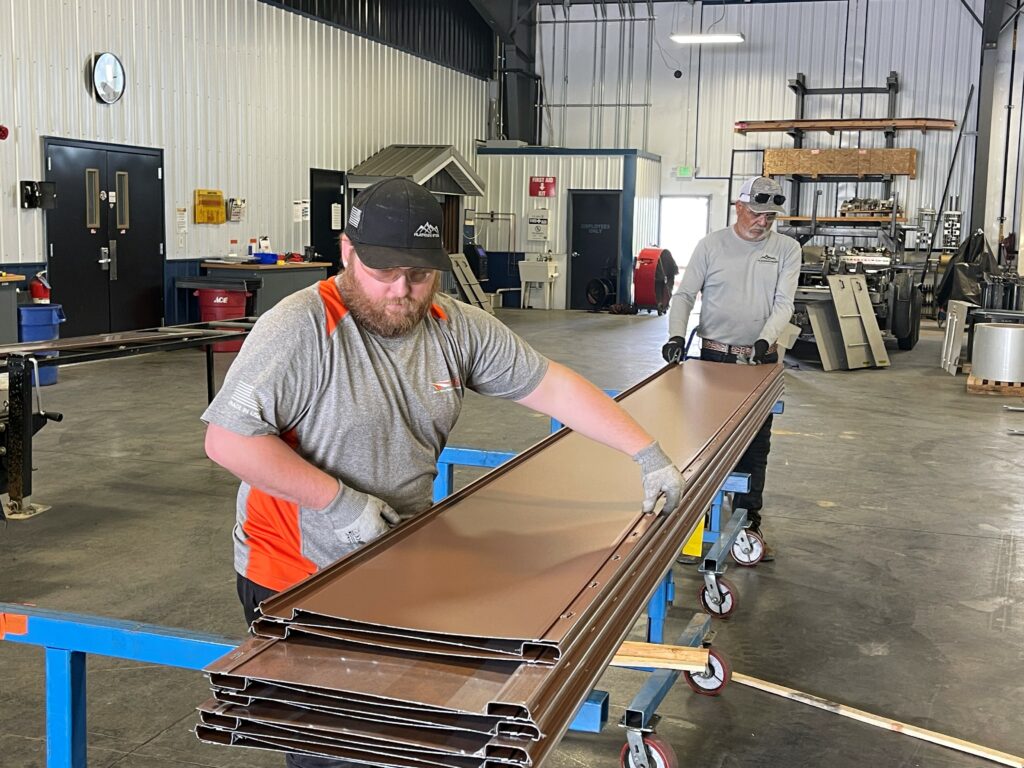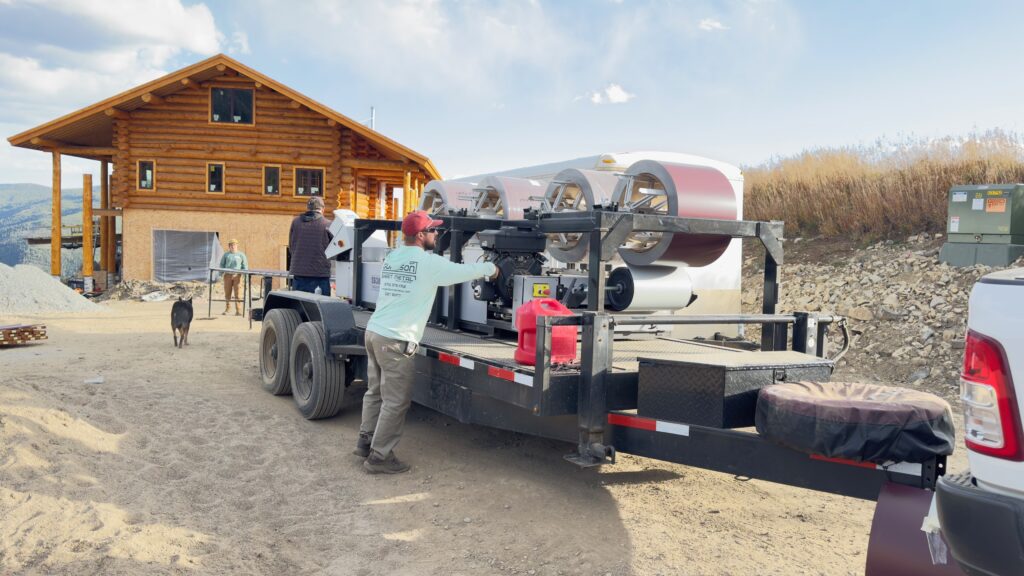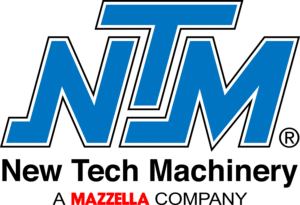What Should Contractors Know Before Buying a Portable Roof Panel or Gutter Machine?
Thinking about investing in a portable rollformer for metal roofing or seamless gutters? Whether you’re starting a business, expanding your services, or just curious about what it takes, there are a lot of important questions to ask before pulling the trigger. We’ve compiled some of the most common questions our team hears from contractors, along with straightforward answers to help guide your decision.
Q: Who is this article for?
A: Anyone interested in purchasing a portable rollformer. However, if you’re new to the game, this article is written with you in mind!

Q: Should I get a portable rollforming machine for residential, commercial, or both?
A: Start by asking yourself what kind of work you’re doing now—and where you want to be in a few years. Some machines are better suited for light residential work, while others can handle larger commercial jobs. If you’re doing a mix or want to grow into commercial projects, go with a more versatile machine like the hydraulic mid-level performer SSH™ MultiPro (residential and light commercial) or the flagship premium SSQ II™ MultiPro (residential, light, or large commercial).
If you’re new to rollforming—maybe you spotted an NTM machine on-site and liked what it could do—then you’ll have a lot of research ahead of you. What’s the market in your area? If it’s mixed residential and commercial, you can choose one or focus on both. What you decide may determine which machine is the right fit.
Q: What panel or gutter size do I need my portable rollforming machine to produce?
A: Panel and gutter sizes vary depending on your market. For gutters, 6″ is becoming more common than 5″, especially with developers and regions dealing with heavier rainfall. Check what’s common in your area. The Mach II™ 5”/6” Combo is our most popular portable gutter machine because it covers both K-style sizes. That said, you might find the Mach II™ 5″ or Mach II™ 6″ sufficient for your given area.
In roofing, you need to know the panel width you want to run and which seam type fits your area. Mechanical seam profiles are popular in places like the Atlantic and Gulf coasts, which require stronger metal roofing due to severe storms. In milder climates, snap lock may do fine, and its installation is less labor-intensive.
Q: Can I just buy a portable rollforming machine and start printing money?
A: We wish! The machine is just one piece of the puzzle. You’ll also need accessories like folders, brakes, trim, downspouts, and more—plus a trailer (or shop space) to run it in. Some folks think the machine does it all, but no, it won’t make your ridge caps, J-channel, or drip edge.
It’s less complicated if you’re manufacturing panels for contractors; you can do chop-and-drops, or they can pick them up from your shop. However, if you’re installing or running panels on-site, you’d best figure out what you need.

Q: How much automation should I get from a portable rollformer?
A: Depends on your workflow. Digital controllers and notching systems cost more up front, but they can reduce waste, speed things up, and make production more accurate. If you’re doing high volume or chop-and-drop work, automation might be worth the upgrade.
If you’re just getting your feet wet and want to start small, we’ve seen businesses built with our starter model, the SSR™ MultiPro Jr. It runs seven optional profiles (each sold separately), covering the most popular sizes of standing seam. However, if you want to run the same profiles but with more automation and options, the SSH MultiPro is a great model that includes hydraulics.
For the ambitious, the SSQ II MultiPro runs 16 optional roof and wall panel profiles, including flush wall, soffit, and board & batten. It’s a premium machine unparalleled in performance, automation, and versatility.
Q: What about portable rollformer training? Is it really necessary?
A: Technically, you don’t have to do it—but we highly recommend it (we can’t emphasize this enough). You’ll learn how to run, maintain, and troubleshoot the machine properly.
Training reinforces your knowledge, even if you’ve previously run one of our machines. Also, bring your crew to training so they can learn from the expert machine specialists at New Tech Machinery. They’ll be taught how to operate and care for your new portable rollformer, as well as proper safety protocol to avoid injuring themselves or others while operating the machine.
If you’ve never used one of our rollformers before, we strongly suggest you don’t assume you’ll figure it out on your own. That usually ends with calls to our service department over issues that could have been easily avoided through training.
To be clear, we don’t teach roof or gutter installation. You can find resources and training programs through your local roofing association or other skills training courses.

Q: Do all profiles come with the portable roof panel machine?
A: Nope. The SSR MultiPro Jr. and SSH MultiPro each come with one profile of your choice. Additional profiles are sold separately. The SSQ II machine base price does not include a panel profile, but NTM offers SSQ II packages that include either a residential or commercial panel profile and popular options for in-plant or portable use.
Some people think they’re getting every option with the base model, but that’s not the case. Be clear about what panel profiles you need, because adding more profiles means a higher investment.
Q: Can I get financing or pay after I receive the portable rollformer?
A: New Tech Machinery requires a 25% deposit on the order and full payment before manufacturing your machine. We do not manufacture or ship the machine without payment. Parts and accessory orders must be paid in full prior to shipment.
Also, while we don’t offer financing, we have financing partners you can contact. Our account managers can provide you with contact details.
First, research types of loans or leases and carefully read the terms of any financial contract you sign. You can find out more about financing options here.
Q: What size trailer do I need for my portable rollformer?
A: For roofing machines like the SSQ II, you’ll want a trailer that’s longer than just the machine—give yourself room to walk around, feed coil, and make adjustments. For gutter machines, we recommend at least 4-6 feet of extra space.
Our trailers are purpose-built, but if you’re sourcing your own, check the machine’s footprint and weight requirements. You don’t want to buy a trailer that’s so small you can’t get around the machine or isn’t capable of supporting the weight of the machine and coils on top of it. NTM’s standard roofing machine trailers are rated for 12,000 lb capacity.

Q: Can I use the portable rollforming machine for both roofing and wall panels?
A: The SSQ II MultiPro runs both roof and wall panels, including flush wall and board-and-batten (remember, profiles are sold separately).
Know what your projects will require. Also, make sure you can use those panels in your area—local building codes vary. Always check with your local roofing association or coil supplier.
Q: What if I buy a used portable roof panel machine?
A: We don’t sell used machines or offer trade-ins. That said, you can still get training on a used NTM machine, but it won’t be free.
FYI: Used NTM machines are a rare find, and don’t lose much value even after years of use.
Q: Do you provide installation support?
A: Nope. We make the machines—we don’t teach you how to install roofing or gutter systems. For that, lean on your roofing associations, coil suppliers, or experienced local pros.
Q: Do I need to be an expert to run these portable rollforming machines?
A: Not at all. But you do need a plan. Know who on your team will be using the machine. Make sure they get trained, and have backup—don’t rely on just one person who might walk off the job and take that knowledge with them.
Q: I’m supposed to pay my order balance before receiving my portable rollformer. Is New Tech Machinery a legit company?
A: Absolutely. We’ve been in business for over 30 years as manufacturers and innovators of portable rollformers. You can visit our facility in Aurora, Colorado. Also, you can view our business standing, certification, and documentation on the Colorado Secretary of State site. Colorado Secretary of State – Summary
Got more questions? Don’t hesitate to reach out to our team—we’re happy to walk you through what machine might be the best fit for your business. This is a big investment, and we want to make sure you’re set up for success. Contact us to speak to a knowledgeable account manager.


